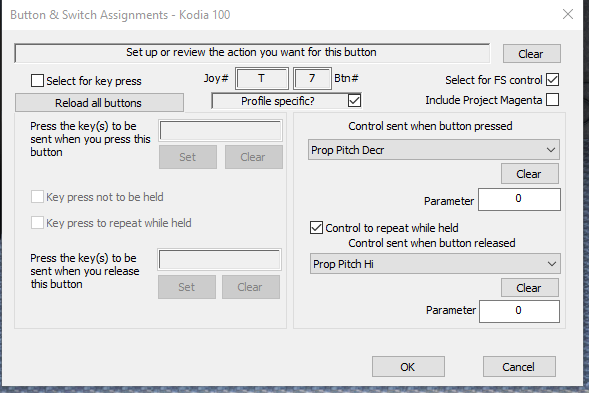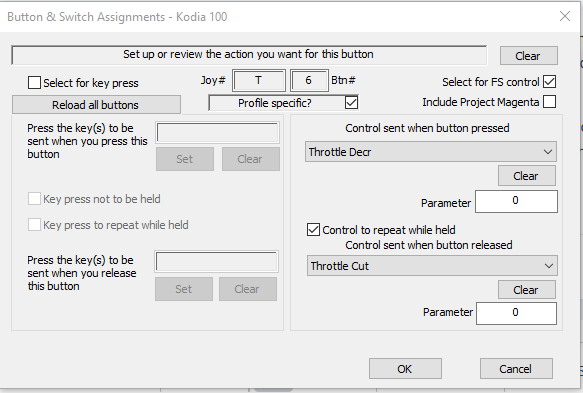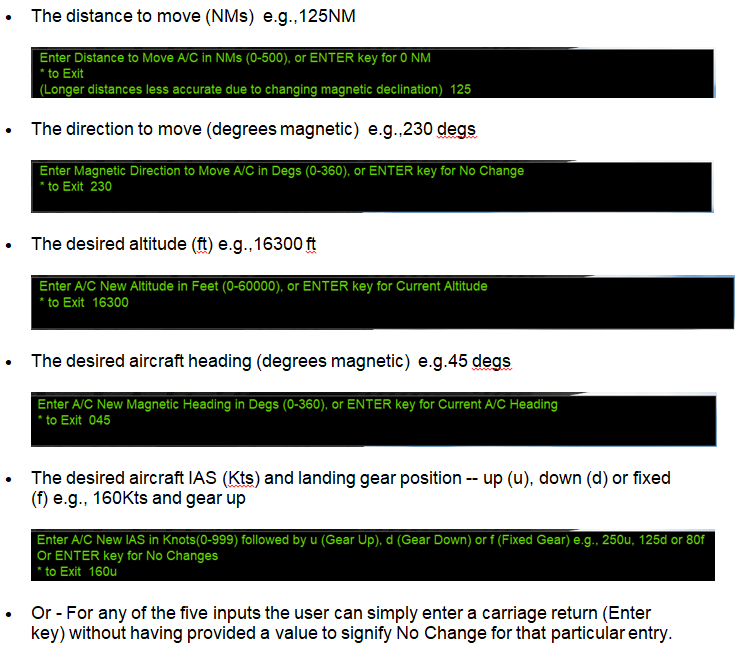
ark1320
Members-
Posts
680 -
Joined
-
Last visited
-
Days Won
17
Content Type
Profiles
Forums
Events
Gallery
Downloads
Everything posted by ark1320
-
BTW, similar to the above, the Saitek TQ has a switch (T7) at the bottom of the Prop axis, and the button assignment below works to move the Kodiak 100 Prop lever into the Feather range when the Saitek prop lever is pulled all the way back to activate the switch. Al
-
I have a Saitek TQ and at the bottom of the throttle axis there is a switch (T6 in this case) which is activated when the throttle lever is pulled all the way back. The button assignment below works with the Kodiak 100 to move the Kodiak's throttle lever into the Beta/Reverse range. I am not familiar with the Saitek X52, but perhaps the below will provide some useful clues that might work with the X52. Al
-
What is the difference between using Throttle Set vs Axis Throttle Set under the FSUIPC7 Axis Assignment Tab? Thanks, Al
-
What is the proper way to add comments to an .Hav file in the FSUIPC7 WASM module Hvar file Persistent area; that is, what symbol(s) designate a comment? Thanks, Al
-
According to the documentation, the default install location for FSUIPC7 is C:\FSUIPC7. I would expect the FSUIPC7.ini file to be in that location. If necessary, a file search for FSUIPC7.ini should work. Al
-
Will aircraft Hvar files that were added to the WASM modules folder by the user be deleted when FSUIPC7 updates? Thx, Al
-
Yes,I am using the WT G1000NXi which is very good ( the latest few SU7 related bugs aside, they will get fixed). Thx, Al
-
John, After the recent SU7 MSFS update I have found that a Lua script that used to work to set a target altitude in the G1000NXi via offset 0x07D4 no longer works. But this script still does work for the G3000, so it seems to me something has changed with the G1000NXi. In trying to figure out what is going on, as an experiment I assigned a key for the event AP Alt Var Set English along with a parameter value which is the target altitude. Again I find that this works for the G3000 but not the G1000NXi. So I'd just like to understand how FSUIPC7 invokes the event AP Alt Var Set English in case this might provide a clue to help explain what might have changed with the G1000NXi. Thanks, Al Edit: The WT guys just found that there was a change made to the G1000NXi altitude code, hopefully that will be fixed so offset 0x07D4 will again work. In the meantime they suggested using the simvar AUTOPILOT ALTITUDE LOCK VAR:1. Is there a way to invoke a simvar within a Lua script?
-
Hi John, I am having trouble trying to create and use an hvar file for an addon aircraft (a mod of the default Bonanza G36). The FSUIPC7 advanced users guide says: Hvar files are loaded if the filename of the hvar file (without the extension) is a substring match to the currently loaded aircraft. 1. Where does FSUIPC7 look for a substring aircraft name match (and I assume the substring can be located anywhere within the name)? For example, the addon mod for the default Bonanza G36 is called Bonanza-Turbo-V4-1SU6 in the Community Folder, but in the MSFS aircraft selection menu is called Textron Aviation Bonanza G36 Turbo, and under "OneStore" is called asobo-aircraft-bonanza-g36. So in this case, what would be some appropriate substrings to use as the name of the hvar file located under the WASM module folder? 2. If an empty file with an appropriate substring name match and an hvar extension is created under the WASM modules folder, will FSUIPC7 discover and populate this file with Hvars, or does the WASM module require the user to find a list of the Hvars somehow and then manually create the subname.hvar file? In other words does FSUIPC7 have the capability to scan for and discover the hvars, or do they need to be provided? Thanks for your help with this, Al
-
MSFSmoveAircraft.lua is a Lua script that can be used to move an aircraft to a new position in the air or on the ground. Each step includes prompts for the required input and format and entered values must be followed by a carriage return (Enter key). User inputs include: The aircraft will be moved after the final carriage return (Enter key). Prior to the move the aircraft can be on the ground or in the air. So, for example, MSFSmoveAircraft can be used to simply turn an a/c around, move it to the other end of a runway, reposition it for another approach after landing, jump ahead in cruise, catch up to another a/c, etc. After the move you will likely have to move the aircraft engine controls (throttle, etc) a bit to let the sim know of their updated settings. MSFSmoveAircraft works with aircraft that adhere to the standard FSUIPC offsets, for example, the default Diamond DA-62. A registered copy of FSUIPC7 is required to execute the MSFSmoveAircraft Lua script. This script uses the wnd (Window ) library for display, so you can move the display window with the arrow keys and use the ctrl + arrow keys to resize the window. The window must have the focus to do this. The new window display position will be stored in your FSUIPC .ini file. As an alternative to using the arrow keys you can directly edit the window position and size coordinates in the FSUIPC7.ini file. Look for entries under [ExtWindow]. It seems best to do this when FSUIPC7 is not running. You may also have to edit the window size and position in the lua files. There are actually two lua scripts involved with MSFSmoveAircraft. The first is MSFSmoveAIrcraft.lua itself, and the other is get_asked_data.lua. The get_asked_data.lua script is called by the MSFSmoveAircraft.lua script. To install these scripts, simply copy and paste them into the directory where you have your FSUIPC.ini file. You must also then enter the directory path to the get_asked_data.lua script into the MSFSmoveAircraft script. To do this open the MSFSmoveAIrcraft script with a text editor like Notepad or NotePad++. At the top of the script you will see -- ***************** Modify path below as needed ******************************************** get_asked_data_path = "C:\\FSUIPC7\\get_asked_data.lua" -- this is YOUR path to the get_asked_data lua file location, modify as needed, note the use of double back slashes \\ -- ****************************************************************************************** Where the path "C:\\FSUIPC7\\get_asked_data.lua" is correct if FSUIPC7 is installed in the root C directory. If your FSUIPC7.ini file (and other lua scripts) are in a different location, modify the above path as needed and save the script. To use MSFSmoveAircraft.lua, after the install start up the sim and use FSUIPC7 to assign a key or button to activate MSFSmoveAircraft.lua in the usual way. MSFSmoveAircraft.lua get_asked_data.lua
-
I think you are correct. To me NumLock works as a kind of lockable shift toggle, so using the shift key toggles NumLock as you said. Interesting. Al
-
Hi John, FSUIPC7 ver 7.2.11a does distinguish between left and right Ctrl and Shift keys for key strokes sent in response to a button push. One interesting thing; with NumLock on the num2, num8, num4 and num6 keys show up as Down, Up, Left and Right when combined with one of the Shift keys. But when combined with one of the Control keys, these numpad keys show up as num2, num8, num4 and num6. So, for example, with Numlock on if I enter lshift + num2 in the keys to be sent when button pushed window, what I get is lshift+Down. However, if I enter lctl+num2 I get lctl+num2. Not sure what to make of this, just passing the info on. Thanks for working on distinguishing the left and right shift and control keys! Al
-
The good news is there is only one Tab key! 😉 Al
-
BTW John, the same issue applies to the Alt and Right Alt keys. Being able to distinguish between the two Ctrl, Shift and Alt keys makes a ton of additional key combinations available via FSUIPC7. Thanks for looking into this, Al
-
MSFS distinguishes between the left and right control keys (called Ctrl and Right Ctrl, respectively). However, FSUIPC7 does not distinguish between these two keys as best as I can determine. I discovered this when trying to send a key stroke with a button push. The command I wanted to activate with a button needed the key combination Right Ctrl + Num1, but FSUIPC7 could apparently only send Ctrl + Num1. I don't know how difficult it would be for a future release of FSUIPC7 to distinguish between the two control keys, but if reasonably doable it would be a useful addition to FSUIPC7. Thx, Al EDIT: Seems the same situation as above applies to the left and right Shift keys (Shift and Right Shift) which MSFS distinguishes between, but FSUIPC7 does not.
-
Hi John, Select for Key Press under the FSUIPC7 Buttons and Switches tab does not seem to be available -- is this because of another SDK limitation? Thx, Al
-
Showing messages with 3380/32FA no longer seem to work.
ark1320 replied to SWhite's topic in FSUIPC7 MSFS
I rewrote a couple of scripts to use event.flag() which then allowed me to keep the windows open. Thx, Al -
Showing messages with 3380/32FA no longer seem to work.
ark1320 replied to SWhite's topic in FSUIPC7 MSFS
Hi John, I have been experimenting with the wnd library. One thing I have noticed is each time a window is opened, there is a flicker and the sim loses focus for an instant as the window opens. Is there a way to leave the window open so each time the same script is run you don't have to reopen the window, thus avoiding the flicker which seems to be associated with opening the window? One thing I tried was using a separate script to open the window (and not close it) and then pass the window handle to the frequently used script using the ipc.set/ipc.get pair, but have not been able to get that to work. I assume that while "w" is used throughout the wnd library documentation as the window handle, any valid Lua variable name can be used for the handle. So different windows can have different handle names. Also, I noticed in your FPS_MonitorW example after closing the window you set the window handle w=0. Why? Thx for any ideas, Al -
Showing messages with 3380/32FA no longer seem to work.
ark1320 replied to SWhite's topic in FSUIPC7 MSFS
I'll certainly consider this if Asobo doesn't fix things -- thanks! Al -
Showing messages with 3380/32FA no longer seem to work.
ark1320 replied to SWhite's topic in FSUIPC7 MSFS
OK John, I understand now. Sigh. I have lots of Lua scripts and just about all of them make use of the FSUIPC text capability. And I'm sure I am not alone in this. Thanks very much for all your efforts with FSUIPC7! Al -
Showing messages with 3380/32FA no longer seem to work.
ark1320 replied to SWhite's topic in FSUIPC7 MSFS
OK John, but I think a message to Asobo from the FSUIPC developer would carry a lot more weight than a message from just a typical MSFS user. Al -
Showing messages with 3380/32FA no longer seem to work.
ark1320 replied to SWhite's topic in FSUIPC7 MSFS
John, Do you know if Asobo is aware of how the broken SimConnect_Text API function impacts FSUIPC, and if they plan to fix it? Thx, Al -
John, Did you ever have a chance to figure out what the purpose or function is of the default entry SteeringTillerControl = 0 in the FSUIPC JoystickCalibration section? Thx, Al



